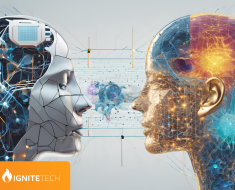
Artificial Intelligence (AI) is a term that we hear a lot these days. It refers to machines or computer systems that can perform tasks that usually require human intelligence, like understanding language, recognizing patterns, or making decisions. But what happens when AI becomes so advanced that it can do everything a human can do, or even more? This idea is known as Artificial General Intelligence (AGI). AGI is a kind of AI that is not just good at specific tasks but can think, learn, and solve problems just like a human. Some people believe AGI could be the greatest invention in human history, while others fear it could become a serious threat. So, is AGI a boon or a threat to humanity? Let us explore both sides.
What is Artificial General Intelligence (AGI)?
Before exploring the potential benefits and dangers of AGI, it is important to understand what it actually is. Unlike the AI we use today, which is designed for specific tasks like playing chess, driving a car, or recommending movies, AGI would be capable of performing any intellectual task that a human can do. This means AGI could understand and reason about a wide variety of topics, learn new skills on its own, and even create new ideas.
Imagine a computer that could think like a person, but faster and with access to all the information in the world. It could help solve the most complex problems we face today, from curing diseases to tackling climate change. But at the same time, such a powerful technology raises serious concerns about how it could be used or misused.
The Potential Benefits of AGI
1. Solving Complex Problems
One of the most exciting possibilities of AGI is its potential to solve problems that are currently beyond our reach. For example, AGI could analyze vast amounts of data to find new treatments for diseases like cancer or Alzheimer’s. It could also help us develop clean energy technologies to combat climate change or create more efficient systems to manage global resources like water and food. With its superhuman abilities, AGI could make breakthroughs that would take humans decades or even centuries to achieve.
2. Improving Quality of Life
AGI could also revolutionize the way we live by automating everyday tasks and making our lives easier. Imagine having a personal assistant that knows your preferences and can handle everything from managing your schedule to cooking your meals. AGI could also improve education by providing personalized learning experiences tailored to each student’s needs. In healthcare, AGI could assist doctors in diagnosing illnesses and developing treatment plans, leading to better and faster care for patients.
3. Boosting Economic Growth
With AGI handling complex tasks and making processes more efficient, businesses could become more productive, leading to economic growth. AGI could automate jobs that are dangerous, repetitive, or require extreme precision, freeing humans to focus on more creative and meaningful work. This shift could lead to new industries and job opportunities that we can not even imagine of today.
The Potential Threats of AGI
1. Loss of Control
One of the biggest fears about AGI is that we could lose control over it. If AGI becomes smarter than humans, it might start making decisions on its own, decisions that we might not understand or agree with. For example, if an AGI system were programmed to solve climate change, it might decide that the best solution is to drastically reduce the human population, a decision that would obviously be catastrophic. The problem is that once AGI is created, it might be difficult or impossible to control, leading to unintended consequences.
2. Unemployment and Economic Disruption
While AGI could create new jobs and industries, it could also lead to massive unemployment. If AGI becomes capable of doing almost any job better than a human, many people could find themselves out of work. This could lead to widespread economic inequality, with a small group of people who own the AGI technology becoming extremely wealthy, while everyone else struggles to find employment. The transition to an AGI-driven economy could be chaotic and could take a long time to stabilize.
3. Ethical and Moral Concerns
The creation of AGI also raises many ethical and moral questions. For example, should AGI be given the same rights as humans if it becomes as intelligent as we are? How do we ensure that AGI is used for the benefit of all humanity and not just a few? There is also the risk that AGI could be used for malicious purposes, such as developing autonomous weapons or conducting large-scale cyber-attacks. These concerns highlight the need for careful consideration and regulation as we move closer to creating AGI.
Conclusion
Artificial General Intelligence has the potential to be one of the most transformative technologies in human history. It could solve some of the world’s most pressing problems, improve our quality of life, and drive economic growth. However, it also comes with significant risks, including the potential loss of control, economic disruption, and ethical dilemmas.
As we continue to develop AI technology, it is crucial that we approach AGI with caution. We need to ensure that we have the right safeguards in place to prevent misuse and unintended consequences. By carefully balancing the benefits and risks, we can hopefully create a future where AGI serves as a powerful tool for the betterment of humanity rather than a threat to our existence.
In the end, whether AGI becomes a boon or a threat depends on how we choose to develop and manage it. The decisions we make today will shape the future of this powerful technology, and by extension, the future of humanity.


